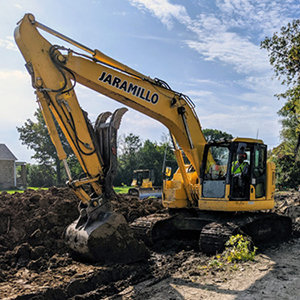Comprehensive Excavation Approaches: Understanding the Basics for Success
The cautious preparation, exact execution, and meticulous attention to information needed in excavation jobs demand an extensive technique that incorporates various fundamental facets. The true proficiency lies not merely in understanding these fundamentals but in perfectly integrating them to browse the intricacies of excavation projects with skill.
Comprehending Excavation Project Planning

Successful excavation tasks are developed on the foundation of detailed and meticulous preparation. The preliminary stage of any excavation project is the drawing board, where important choices are made that can significantly affect the end result of the project. Throughout this phase, it is vital to gather all relevant info regarding the website, including topographical surveys, dirt make-up, and any potential threats that may exist. Recognizing the job timeline, extent, and budget constraints is important for producing a comprehensive excavation strategy that makes certain the task's success.
One key aspect of excavation project preparation is the development of a comprehensive timeline that outlines the series of landmarks, target dates, and activities. This timeline works as a roadmap for the job group, permitting them to track development and make required adjustments to make certain the job remains on timetable. In addition, a distinct spending plan that represents all expenses, consisting of equipment rental, labor costs, and materials, is vital for staying clear of cost overruns and delays. By carefully thinking about all these factors throughout the drawing board, excavation projects can be performed successfully and properly, causing effective outcomes.
Dirt Analysis and Website Evaluation
Conducting detailed soil analysis and site evaluation is an essential action in the prep work phase of any kind of excavation job. Soil analysis includes identifying the structure, framework, and properties of the dirt at the excavation website. This information is crucial for understanding the dirt's bearing ability, moisture content, and potential for disintegration, which are essential elements in identifying the excavation approaches and devices required for the project.
Site evaluation surpasses soil analysis and incorporates a more comprehensive evaluation of the overall site conditions. This evaluation consists of determining any type of possible dangers, such as underground energies, environmental issues, or unpredictable surface, that can influence the excavation process. By completely examining the website, task supervisors can establish reliable excavation methods that focus on security, effectiveness, and environmental management.
Utilizing innovative innovations like ground-penetrating radar, dirt tasting, and drone surveys can improve the accuracy and efficiency of soil analysis and site analysis. Investing time and resources in these initial steps can ultimately save time and avoid costly hold-ups or issues throughout the excavation procedure.
Tools Selection and Usage
Reliable excavation tasks depend heavily on critical devices option and application to make certain optimum performance and performance. Selecting the appropriate equipment for the task is important in making the most of efficiency and minimizing downtime. Elements such as the kind of dirt, depth of excavation, and project range play a significant duty in identifying one of the most ideal equipment for the job handy.

In enhancement to choosing the appropriate tools, proper use is essential to job success. Operators must be educated to deal with the equipment safely and efficiently - dump truck companies in ohio. Normal maintenance checks and prompt repair services help protect against breakdowns and ensure regular efficiency throughout the project
Safety And Security Steps and Regulations Conformity
In the realm of excavation projects, focusing on safety and security actions and conformity with guidelines is extremely important to making sure a legally sound and secure operational environment. Safety actions include a series of practices, including carrying out detailed site evaluations, applying proper signage and obstacles, and providing sufficient safety and security training for all workers associated with the excavation process. Adherence to laws, such as learn this here now OSHA demands in the United States, ensures that the excavation project fulfills the essential criteria to protect workers, bystanders, and the surrounding environment.

Tracking Progression and Adjusting Approaches
How can predict supervisors efficiently track over here the improvement of excavation tasks and adapt their methods appropriately to maximize results? Monitoring development is crucial for ensuring that excavation tasks remain on track and satisfy target dates. Project supervisors can use different devices and methods to track development, such as day-to-day development reports, normal site examinations, and progressed monitoring technologies like drones and GPS tracking systems. By continually checking the project's development, managers can identify any possible delays or concerns early and take proactive steps to address them.
Final Thought
Finally, mastering the fundamentals of detailed excavation techniques is important for the success of any job. By understanding project planning, assessing dirt and site problems, selecting proper devices, following safety and security policies, and monitoring development, task supervisors can guarantee a effective and smooth excavation process. Implementing these methods will certainly bring about successful results and reduce prospective threats or troubles throughout the excavation project.
The initial stage of any type of excavation project is the preparation phase, where essential decisions are made that can dramatically impact the end result of the project. Understanding the task spending plan, timeline, and extent constraints is essential for developing an extensive excavation strategy that makes certain the project's success.
Exactly how can forecast supervisors successfully track the innovation of excavation tasks and adapt their approaches appropriately to enhance end results? By very closely checking progression and being willing to adjust strategies, task supervisors can enhance the total success of excavation projects.
By understanding job planning, evaluating soil and site problems, picking see page proper tools, conforming with safety and security laws, and checking progress, job managers can ensure a smooth and efficient excavation procedure.